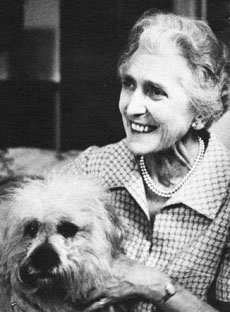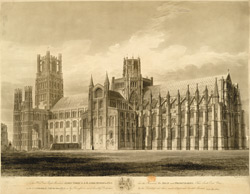
I am reading The Dean’s Watch by Elizabeth Goudge. It is one of the most beautiful books I have ever read.
Elizabeth Goudge was a writer, she was born in 1900 in Wells where her father was the Principal of the theological college there. She subsequently lived in the cathedral city of Ely and finally in Oxford, where her father became Regius Professor of Divinity.
She always wanted to write, but did not publish anything until she was in her thirties, having first acceded to her parents’ desire for her to teach arts and crafts. But her true vocation lay in writing, and from then on she wrote and published into the seventies. She was classed as a writer of romantic fiction and as a Christian writer, but she was far more than that.
I came late to the works of Elizabeth Goudge, only picking up one of her books when I returned to England after I retired in 1989. There was something about her books which was different and which appealed to me. I became a great fan and even visited Rose Cottage, near Reading, where she lived till the end of her life – the occasion being the erection of a blue plaque in honour of her residence there.
Some of her books are now difficult to find, so my reading has been sketchy, but I recently came across her book The Dean’s Watch. I found it the perfect antidote for lockdown, the pandemic and the war in the Ukraine.
Written in the days when there were none of the distractions around us today, where speed is of the essence, it moves at a very leisurely pace with long, beautiful descriptions of landscape, townscape and the different characters in the book.
To my mind, she is a very underrated writer. She has great imagination and writes fluently and poetically, with extraordinary insight into a great variety of people, old and young, poor and rich, saintly and wicked. She seems to have an innate understanding of them all.

The story is based around the city of Ely and its cathedral, that great edifice rising into the sky above the city, a symbol of eternity. The characters, almost Dickensian in their variety and drollness, are all described with acuity and affection. There is the Dean himself, a stern, huge and ugly figure, distant and erudite and much feared by all; his beautiful wife concerned only with her own beauty. Then there is Isaac Peabody, a clock maker and watch maker, a master craftsman in his own right, who lives only for his work, and his sister Emma. Round these main characters a galaxy of supporting players, Job and Polly, the young lovers, who swim into the orbit of of Isaac and the Dean; Garland who attends the Dean; Miss Montague, the elderly lady around whom the others seem to revolve, and the small child Bella, who breathes life and vitality . And many, many other minor characters.
Around these characters Elizabeth Goudge has a woven a story of love and hatred, of poverty and suffering, of endurance and triumph, and finally after a great disaster, comes a moment of renewal and redemption, a resurrection into new life. The ending is so sudden, like a great clashing chord, and yet absolutely right, nothing more is needed.
To my mind, this book is a masterpiece. Elizabeth Goudge writes beautifully, with a lightness of touch and a depth of imagination. She seems to have an intuitive insight into all her characters, and they spring to life in vivid detail. On many occasions I am moved to tears and at others I am laughing with delight, or chuckling over some dry comment.
In her time Elizabeth Goudge was criticised for being sentimental, for her happy endings. I would describe her as a woman of sentiment and true perception: she could see beyond the seeming tragedy of life to what really mattered, and this is what has so uplifted me in reading her book during these cataclysmic times.
Our current literature seems to be pervaded by cynicism and evil, darkness and death. She writes about goodness and kindness and above all, love. Love in every shape and form: love of a husband for his wife; young love; love of a servant for his master; love of a small child for life itself, and love of a great craftsman for his craft. She seems to understand them all.
Isaac Peabody, who does not believe in God, comes at last to visit the Cathedral. Here I quote: “Faith in God. God. A word he had always refused. But the Dean had said, put the word love in its place. He did just that, speaking to this warmth. ‘Bring us, O Love, at our last awakening, into the house and gate of heaven.'”
‘A perfectly crafted piece’ — as they say in Sky Arts.
Oh Daphne,
I really enjoyed reading about The Dean’s Watch and author Elizabeth Goudge. I am very fond of Ely, so I will add this book to my ‘Want to Read’ list. Thank you for sharing. Please share to Authors on Tour page/group if you wish.
Jan xx
LikeLike
So glad you liked it Jan. I will share it to Authors on Tour.
LikeLike